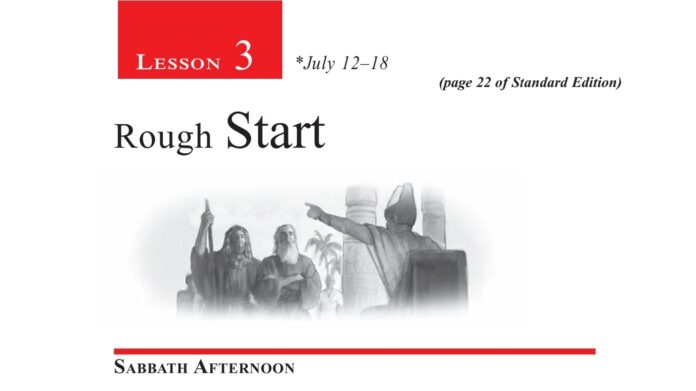Lesson Three: ROUGH START
Introduction: Even when Moses had heeded to the call of leading God’s children out of Egypt to the Promised land, the beginning of the journey as far as telling Pharaoh about the Lord’s commands was not smooth. This week, we are studying events that surround the encounter that Moses and Aaron had with Pharaoh, prior to the exodus.
Memory Text: Exodus 5:1-2(NKJV)
[1]Afterward Moses and Aaron went in and told Pharaoh, “Thus says the Lord God of Israel: ‘Let My people go, that they may hold a feast to Me in the wilderness.’ ”
[2]And Pharaoh said, “Who is the Lord, that I should obey His voice to let Israel go? I do not know the Lord, nor will I let Israel go.”
SABBATH; Many believe that following God means a life of ease—but Scripture tells a different story. Even with a clear calling, like Moses received at the burning bush, the path was far from simple. God spoke, miracles followed, yet Moses still faced fear, opposition, and struggle. Likewise, our obedience may bring unexpected challenges, not instant success. Trials often raise hard questions—but God’s answers come in His time, not ours. The call is clear: trust Him anyway. God’s purposes are deeper than comfort, and His timing wiser than ours. Like Moses, we’re called not to ease, but to faith-filled perseverance and divine partnership.
SUNDAY; Moses tells Pharaoh about the command of the Lord to let His people go, however, Pharaoh asks who the Lord is. He asks this question, not because He is unaware of who God is but because He opposes and fights God in defiance to His commands. This denial of God is seen as atheism and a similar instance where a similar spirit of unbelief and defiance exists will be seen in these last days as well.
(READ Exodus 5:1&2; John 17:3)
MONDAY; Moses and Aaron confront Pharaoh as commanded by the Lord, however, the Israelites, whose freedom from Egypt they sought, were subjected to farther torment and hard labourous conditions. The Israelites’ leaders end up unhappy and their frustration makes Moses and Aaron uneasy about these unpleasing outcomes.
(READ Exodus 4:29-31; 5:3-23)
TUESDAY; Moses then turns to God while complaining about the unsuccessfulness of the mission yet God had promised otherwise. God then patiently reassures Moses of how He was going to actively intervene for His people. The Lord counts it upon Himself to fulfill the covenantal promise He had given to Abraham, Isaac and Jacob, which is delivering their descendants into the Promised land. The same gift of redemption and salvation is offered unto us today as well.
(READ Exodus 5:22-6:8)
WEDNESDAY; Moses reassures the Israelites about God’s promises of deliverance, however, their grief and suffering shuts them away from believing what Moses told them. This prompts Moses to believe that Pharaoh, a heathen could not believe the message delivered from God either. However, we are reminded of the fact that God always keeps His promises and is ready to comfort us through life’s challenges just like Asaph the Psalmist reechoed the same hope and kept praising God amidst his trials.
(READ Exodus 6:7,9-13; Psalms 73:23-26; Isaiah 41:13; Matthew 28:20; John 14:27; 16:33; Philippians 4:6&7)
THURSDAY; Upon the command to re-face Pharaoh, Moses objects this call, with the claim of being uneloquent enough. God tells Moses that He will make him a god to Pharaoh and he would tell Aaron what to tell Pharaoh. This shows us the fact that God uses messengers known as prophets to deliver His message, and Aaron would be the prophet in this case. However much the Egyptians would not easily bend to obedience, the Lord promised that at the end, they would testify to the glory of God.
(READ Exodus 6:28-7:7)
FRIDAY; The Lord told Moses that the signs and wonders which he should show before Pharaoh would harden his heart, because he would not receive them, and God would multiply his signs. Every punishment which the king rejected would bring the next chastisement more close and severe, until the proud heart of the king would be humbled, and he should acknowledge the Maker of the heavens and the earth as the living and all-powerful God.
(READ Spiritual gifts .vol 3 pp. 203&204 and “The Plagues of Egypt” pp.257-265 in Patriarchs and Prophets by Ellen G White)
CAPTIONS:
SUNDAY; Who is the Lord?
MONDAY; A rough start
TUESDAY; The Divine “I”
WEDNESDAY; Uncircumcised lips
THURSDAY; Like God to Pharaoh
FRIDAY; Further thought
DISCUSSION QUESTIONS;
- If someone asked, “Do you know the Lord?” How would you respond? If Yes, what would you say He is like, and why?
- Moses ran out of excuses for not following what God had called him to do. What excuses might we use to try to get out of what we know God wants us to do?
- Think of a time when, as you heeded God’s call in your life, things did not go well, or certainly did not start off well. What lessons have you learnt over time from that experience?
- Why is it that our expectations for God’s interventions and actions are usually not fulfilled? Why does He so often act only when all hopes are shattered?



